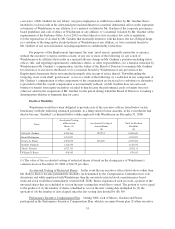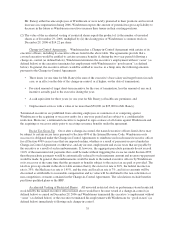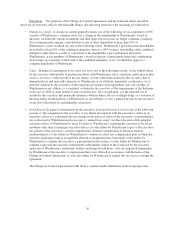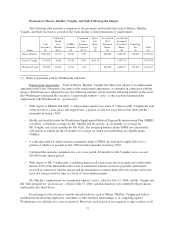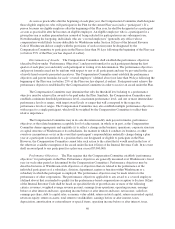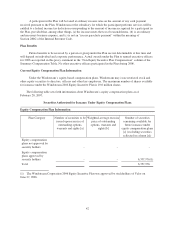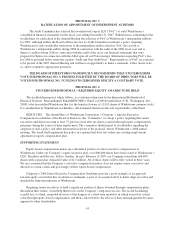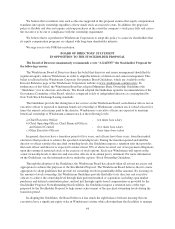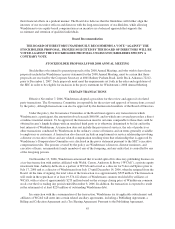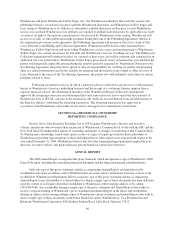Windstream 2006 Annual Report Download - page 40
Download and view the complete annual report
Please find page 40 of the 2006 Windstream annual report below. You can navigate through the pages in the report by either clicking on the pages listed below, or by using the keyword search tool below to find specific information within the annual report.
Definitions. For purposes of the Change-in-Control Agreements and the restricted shares described
above for all executive officers other than Mr. Raney, the following terms have the meanings set forth below:
•Change-in-control. A change-in-control generally means any of the following: (i) an acquisition of 50%
or more of Windstream’s common stock; (ii) a change in the membership of Windstream’s board of
directors, such that the current incumbents and their approved successors no longer constitute a majority;
(iii) a reorganization, merger, consolidation or sale or other disposition of more than 50% of
Windstream’s assets in which any one of the following is true: Windstream’s pre-transaction shareholders
do not hold at least 50% of the combined enterprise; there is a 50%-or-more shareholder of the combined
enterprise (other than as a result of conversion of the shareholder’s pre-combination interest in
Windstream); or the members of Windstream’s board of directors (immediately before the combination)
do not make up a majority of the board of the combined enterprise; or (iv) stockholders approve a
complete liquidation of Windstream.
•Cause. In general a termination is for cause if it is for any of the following reasons: (i) the willful failure
by the executive substantially to perform his duties with Windstream; (ii) a conviction, guilty plea or plea
of nolo contendere of the executive for any felony; (iii) the willful misconduct by the executive that is
demonstratively and materially injurious to Windstream or its affiliates, monetarily or otherwise; (iv) a
material violation by the executive of the corporate governance board guidelines and code of ethics of
Windstream or any affiliate; (v) a material violation by the executive of the requirements of the Sarbanes-
Oxley Act of 2002 or other federal or state securities law, rule or regulation; (vi) the repeated use of
alcohol by the executive that materially interferes with his duties, the use of illegal drugs, or a violation of
the drug and/or alcohol policies of Windstream or any affiliate; or (vii) a material breach by the executive
of any non-solicitation or confidentiality restrictions.
•Good Reason. In general a termination by the executive is for good reason if it is for any of the following
reasons: (i) the assignment to the executive of any duties inconsistent with the executive’s status as an
executive officer or a substantial adverse change in the nature or status of the executive’s responsibilities;
(ii) a reduction by Windstream in the executive’s annual base salary; (iii) the relocation of the principal
executive offices of Windstream by more 35 miles or Windstream’s requiring the executive to be based
anywhere other than its principal executive offices; (iv) the failure by Windstream to pay to the executive
any portion of the executive’s current compensation, deferred compensation or business expense
reimbursements; (v) the failure by Windstream to continue in effect any compensation plan in which the
executive participates unless an equitable alternative arrangement has been made, or the failure by
Windstream to continue the executive’s participation in those plans; (vi) the failure by Windstream to
continue to provide the executive with benefits substantially similar to those enjoyed by the executive
under any of Windstream’s retirement, welfare and fringe benefit plans; (vii) any purported termination
by Windstream of the executive’s employment that is not effected in accordance with the terms of the
Change-in-Control Agreement; or (viii) any failure by Windstream to require the successor to assume the
agreement.
The Change-in-Control Agreement for Mr. Raney contains similar definitions of the foregoing terms.
36









